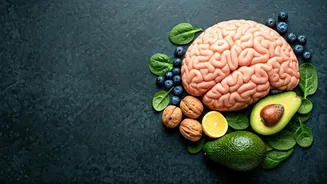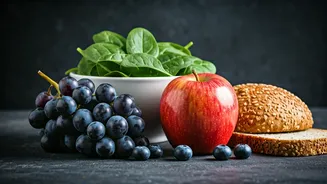Fatty Fish
Fatty fish, such as salmon, trout, and sardines, are rich in omega-3 fatty acids, crucial for brain health. These fats contribute to brain cell structure
and communication. Research indicates that higher omega-3 intake correlates with improved cognitive function and a reduced risk of cognitive decline. Consider including these fish in your diet at least twice a week. Prepare them through various methods, like grilling, baking, or pan-frying, to make them part of your balanced diet. The regular consumption of omega-3-rich foods helps maintain the structure of brain cells, improving communication between them. By regularly including these fish in your diet, you provide your brain with the necessary components to work at its best.
Blueberries' Benefits
Blueberries are packed with antioxidants called flavonoids, which combat oxidative stress and inflammation, key factors in brain aging. These compounds can improve communication between brain cells, supporting memory and learning. Studies suggest that regularly consuming blueberries can enhance cognitive performance and protect against age-related cognitive decline. Adding blueberries to your breakfast cereal, smoothies, or enjoying them as a snack is an effortless way to boost your brain health. Their antioxidants help protect brain cells from damage and improve brain cell connectivity. Embrace the blueberry's natural power to potentially boost your cognitive abilities and enjoy a treat that helps your brain.
Broccoli's Brainpower
Broccoli is a nutritional powerhouse, rich in vitamin K, known for its role in cognitive function and brain health. It also provides antioxidants that protect the brain from damage. The high vitamin K content in broccoli helps improve memory, and its antioxidant properties shield the brain from oxidative stress. Incorporate broccoli into your meals by steaming, roasting, or including it in salads. Vitamin K, abundant in broccoli, has been linked to better memory performance and overall cognitive health. This vegetable's compounds contribute to maintaining healthy brain function and help you perform at your best.
Dark Chocolate's Boost
Dark chocolate, especially varieties with a high cocoa content, offers numerous brain-boosting benefits. It contains flavonoids, which act as antioxidants and improve blood flow to the brain, enhancing cognitive function and mood. Cocoa also has caffeine, which can boost alertness and focus. Enjoying a small piece of dark chocolate can improve cognitive function and mood, offering both mental and sensory benefits. The flavonoids improve blood flow to the brain, enhancing cognitive function, while caffeine boosts alertness and focus. The rich flavors of dark chocolate coupled with its brain-enhancing effects make it a great option for supporting mental sharpness and enjoying a sweet treat.
Nuts and Seeds
Nuts and seeds, like walnuts, almonds, and flaxseeds, are excellent sources of vitamin E, an antioxidant that protects the brain. Walnuts are particularly noted for supporting cognitive health, potentially improving memory and overall brain function. Snack on a handful of nuts or seeds each day, adding them to your salads or meals. Including nuts and seeds in your diet provides essential nutrients that are vital for sustaining healthy brain function. Walnuts, specifically, are often linked to improvements in memory and overall brain health. Their properties make them a useful addition to a diet aiming to boost cognitive performance, protecting the brain from oxidative stress.
Whole Grains' Role
Whole grains, such as brown rice and oatmeal, are vital for brain health because they provide a steady supply of glucose, the brain's primary fuel. They also contain vitamin E and B vitamins, which support healthy brain function. The sustained release of glucose from whole grains helps maintain focus and concentration throughout the day. Opting for whole-grain options over refined grains helps provide a steady stream of glucose, essential for sustaining brain function. B vitamins from these grains also support cognitive performance. By providing stable energy and essential nutrients, whole grains serve as a cornerstone of a brain-healthy diet. Include them in your breakfast or meals for long-lasting focus.
Avocado's Advantages
Avocados are rich in healthy fats that support blood flow to the brain, improving cognitive function. They also help lower blood pressure, which is linked to better brain health in the long run. The monounsaturated fats in avocados contribute to healthy blood flow, which is essential for brain function. Use avocado in your salads, sandwiches, or enjoy it as a snack. Their healthy fats and nutrients support overall cognitive health. Eating avocados can potentially boost your brainpower. The healthy fats support blood flow to the brain, which in turn leads to improved cognitive function, and maintaining better brain health in general.
Oranges and Citruses
Citrus fruits like oranges are packed with vitamin C, an antioxidant crucial for protecting the brain against free radical damage. Vitamin C supports brain health and may also help improve mood and cognitive function. Consuming citrus fruits daily can boost your intake of Vitamin C, helping protect brain cells. They offer antioxidant protection and contribute to improved cognitive function and mood enhancement. Consider adding oranges or other citrus fruits to your daily diet to receive these brain-boosting benefits.
Eggs' Cognitive Boost
Eggs are a fantastic source of choline, a nutrient vital for brain health and memory. Choline is used by the body to produce acetylcholine, a neurotransmitter essential for communication between brain cells. Regular consumption of eggs supports the production of acetylcholine, potentially enhancing memory and cognitive function. Include eggs in your breakfast or add them to your other meals throughout the day. Their choline content can help improve memory. You can get numerous benefits from this simple, accessible food, making it an excellent addition to your diet. The choline found in eggs can help improve memory, offering a simple way to boost your cognitive health.
Green Tea for Brains
Green tea is rich in antioxidants and contains caffeine, both of which can enhance brain function. Caffeine promotes alertness, while antioxidants protect brain cells. Research indicates that regular green tea consumption can improve focus, memory, and cognitive performance. Enjoying green tea daily provides both mental alertness and antioxidant protection for brain health. Its caffeine content boosts alertness, and the antioxidants provide protection. Drink a cup or two of green tea daily to boost focus, memory, and overall cognitive performance, supporting the long-term health of your brain.




















